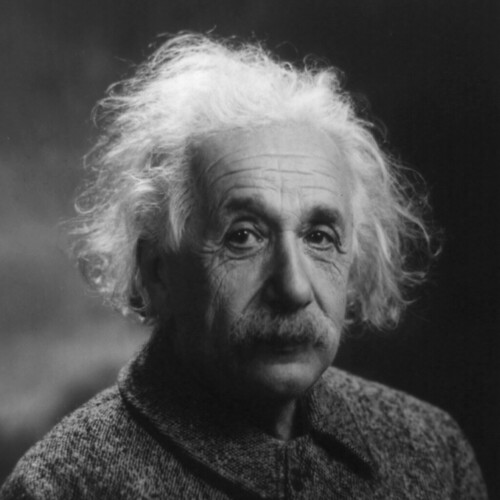
courtesy of Library of Congress
The Littlejohn Collection at Wofford College has a letter written by Albert Einstein to a friend in Germany. In the letter, Einstein alludes to the anti-Semitism spreading across Europe in the 1930s and 40s.
[Transcription, translated from German:]
The 31st of March 1940
Mr. Lionel M. EttlingerHotel Delmonico
New York City
Dear Mr. Ettlinger:
Sincere thanks for your congratulation and the pipe you sent me. -- Meanwhile terrible things happen and one cannot do anything about it, except for troublesome help in individual cases. You are quite right, it is hard to understand that the people in England Anno 33 did not earnestly consider your materials. How easy it would have been to avoid the present calamity.
Fondest regards
Your
A. Einstein
Not much is written about Lionel Ettlinger. He frequently corresponded with Einstein about Jewish refugees in the years leading up to and during World War II. Both men helped Jews through their international connections and their personal wealth. Einstein refers to this in his letter when he writes “terrible things happen and one cannot do anything about it, except for troublesome help in individual cases.” Einstein would often give his research prize money to German-Jewish immigrants who came to America.
Einstein — a Jew, a democrat, a scientist, and eventually a socialist — had always been a target of right-wing German nationalists, even before Hitler entered the picture, and he faced anti-Semitism throughout his career as a scientist. Some even speculate that he would have won the Nobel Prize ten years earlier if he hadn’t been a Jew.1
By 1932, Einstein and his wife, Elsa, had received many warnings and threats. They left Germany in December 1932 to spend a semester at the California Institute of Technology where Einstein was a guest faculty member. Though Einstein was quoted saying that he was not abandoning Germany (to the New York Times), he left for America with thirty pieces of luggage and a string of death threats. With the Nazi party gaining strength every day, Einstein had to suspect that there was some possibility he’d never return to Germany.2 By 1933, the Nazis had put a $5,000 reward on Einstein’s head.3 In this way, Einstein became a refugee, saying “as long as I have any choice in the matter, I shall live only in a country where civil liberty, tolerance, and equality of all citizens before the law prevail.”4 He had many job offers around Europe, but he didn’t feel safe anywhere in Europe. He moved to Princeton, New Jersey.
Being Jewish was perhaps Einstein’s most enduring commitment outside physics. He said “my relationship with Jewry had become my strongest human tie.”5 Yet Einstein’s Jewish identity was slow to evolve and didn’t mature until his late thirties. In fact, his interest in anti-Semitism directed him back to his Jewish roots.6
As if conducting one of his science experiments, Einstein tried to understand the nature and motives of anti-Semitism, and he hoped to find a way to cope with and combat it. He spent long hours pondering the question “Why do they hate Jews?” In 1938, he published an article in Collier’s Magazine that outlined his opinions and thoughts regarding this question. While still in Germany, Einstein had often spoken out against the Nazis and anti-Semitism, as well as racism in America. Throughout his time in America, Einstein was a strong supporter of African-American rights and anti-lynching.7
While science was a life-consuming puzzle for Einstein, the treatment of Jews across Europe during the first half of the 20th century was much less complicated. He ends his letter: “how easy it would have been to avoid the present calamity.”- Hannah Jarrett ‘12
1 Fred Jerome and Rodger Taylor, Einstein on Race and Racism, New Jersey: Rutgers University Press, 2005, p. 3-4.
2 Jerome, p. 6.
3 Jerome, p. 7.
4 Ewald Osers, trans., Albert Einstein: A Biography, New York: Penguin Group, 1997, p. 659.
5 Osers, p. 488.
6 Hanoch Gutfreund, “Einstein’s Jewish Identity,” in Einstein for the 21st Century: His Legacy in Science, Art, and Modern Culture ed. Peter L. Galison et al., Princeton: Princeton University Press, 2008, p. 28.
7 Jerome, p. 7-8.




This professional hacker is absolutely reliable and I strongly recommend him for any type of hack you require. I know this because I have hired him severally for various hacks and he has never disappointed me nor any of my friends who have hired him too, he can help you with any of the following hacks:
ReplyDelete-Phone hacks (remotely)
-Credit repair
-Bitcoin recovery (any cryptocurrency)
-Make money from home (USA only)
-Social media hacks
-Website hacks
-Erase criminal records (USA & Canada only)
-Grade change
Email: cybergoldenhacker at gmail dot com